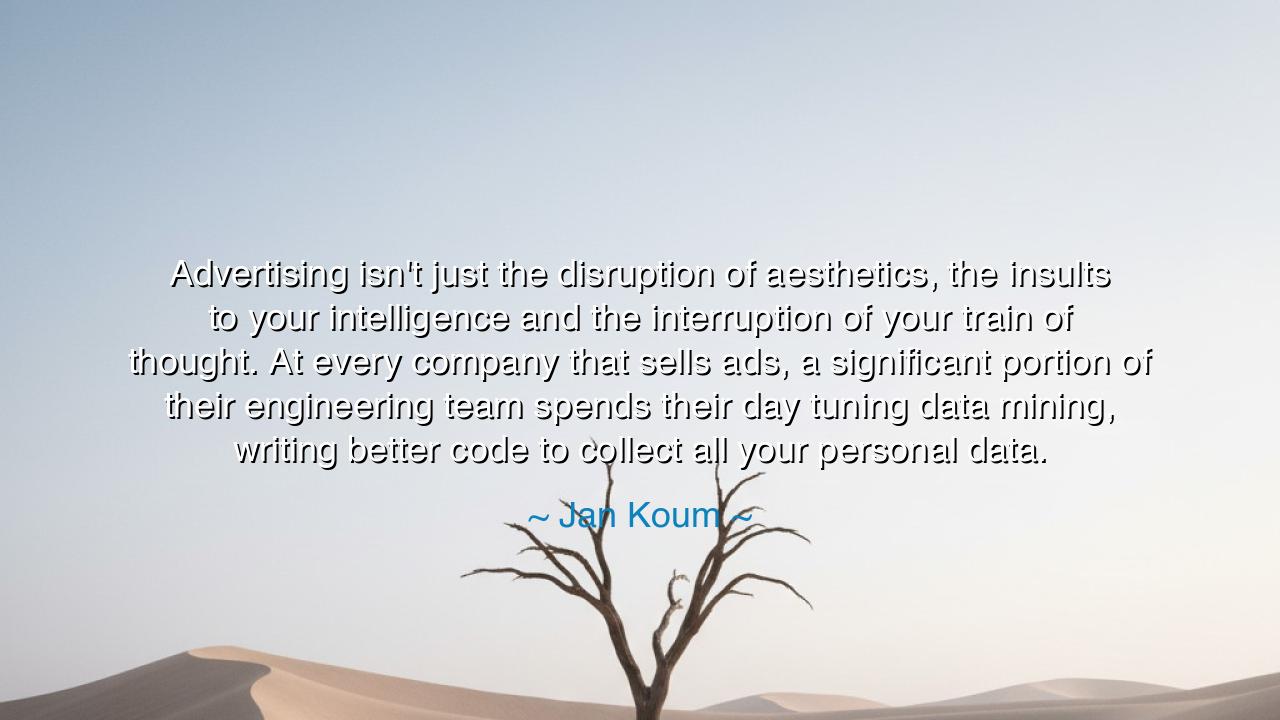
Advertising isn't just the disruption of aesthetics, the insults
Advertising isn't just the disruption of aesthetics, the insults to your intelligence and the interruption of your train of thought. At every company that sells ads, a significant portion of their engineering team spends their day tuning data mining, writing better code to collect all your personal data.






Hearken, children of the modern age, and listen to the words of Jan Koum, who spoke with the clarity of a sage confronting unseen forces: “Advertising isn't just the disruption of aesthetics, the insults to your intelligence and the interruption of your train of thought. At every company that sells ads, a significant portion of their engineering team spends their day tuning data mining, writing better code to collect all your personal data.” Within this revelation lies a warning as ancient as civilization itself: the subtler forms of power often work unseen, shaping our minds, our choices, and our very sense of self.
Since the dawn of commerce, merchants have sought ways to persuade, to influence, to capture attention. In the marketplaces of Athens or Babylon, signs, proclamations, and heralds sought to sway the citizenry, each message carefully crafted to appeal to desire, fear, or curiosity. Koum reminds us that in the modern era, these ancient arts have transformed: the disruption of aesthetics, once the cry of a street crier, now flows invisibly through screens and networks, shaping perception without our conscious notice.
Yet the harm is not merely in interruption. Advertising insults intelligence, for it assumes that the mind can be coaxed, manipulated, or distracted with appeals that bypass reason. Like the courtiers of old who flattered rulers to gain influence, today’s systems exploit the human propensity for attention, playing upon our emotions, habits, and vulnerabilities. The ancient lesson is clear: power without transparency, persuasion without honor, corrodes trust and erodes the freedom of the mind.
Koum unveils an even deeper truth: the work behind these influences is deliberate and technical. A significant portion of engineering teams labor not to serve the user, but to perfect the mechanisms of surveillance and data collection. The modern marketplace has become a labyrinth, each click and movement mapped, measured, and monetized. In the streets of Florence, merchants once observed customers’ choices to improve trade; today, algorithms watch every heartbeat of interaction, capturing the unseen rhythms of human behavior with meticulous precision.
Consider the story of Cambridge Analytica, whose harvesting of personal data influenced elections and swayed public opinion across nations. The invisible code, the subtle nudges, and the careful targeting turned information into power, shaping societies in ways imperceptible to those affected. Koum’s warning resonates: the disruption of thought is not merely a minor annoyance—it is a tool of control, wielded through the very systems that promise connection and convenience.
The lesson for the vigilant is profound. Awareness is the first step toward freedom. To recognize the mechanisms of influence, to understand that much of our digital life is observed, measured, and monetized, is to regain agency over our attention and our choices. Koum teaches that technology is not inherently malevolent, but when wielded without regard for ethics, it becomes a subtle instrument of manipulation, as potent as any sword or decree in history.
Practical action follows naturally. Guard your data, question the incentives behind the platforms you use, and seek transparency in every digital transaction. Limit exposure to those who would profit from your habits without consent. Encourage and support systems that prioritize privacy and integrity over exploitation. By doing so, one transforms vigilance into defense, wisdom into agency, and reflection into liberty.
Finally, remember this eternal truth: power is often exercised in the shadows, shaping minds before bodies, influence before action. As Jan Koum warns, the modern age demands a new kind of discernment—one attuned to the subtle currents of digital persuasion, the hidden labor of data collection, and the imperatives of ethical engagement. Guard your thoughts, value your privacy, and act with awareness, for in these choices lies the preservation of intellect, autonomy, and the freedom of the soul.
If you wish, I can also craft a poetic, evocative version of this explanation for audio narration, emphasizing rhythm and imagery to make Koum’s teaching vivid and compelling. Do you want me to do that?






AAdministratorAdministrator
Welcome, honored guests. Please leave a comment, we will respond soon